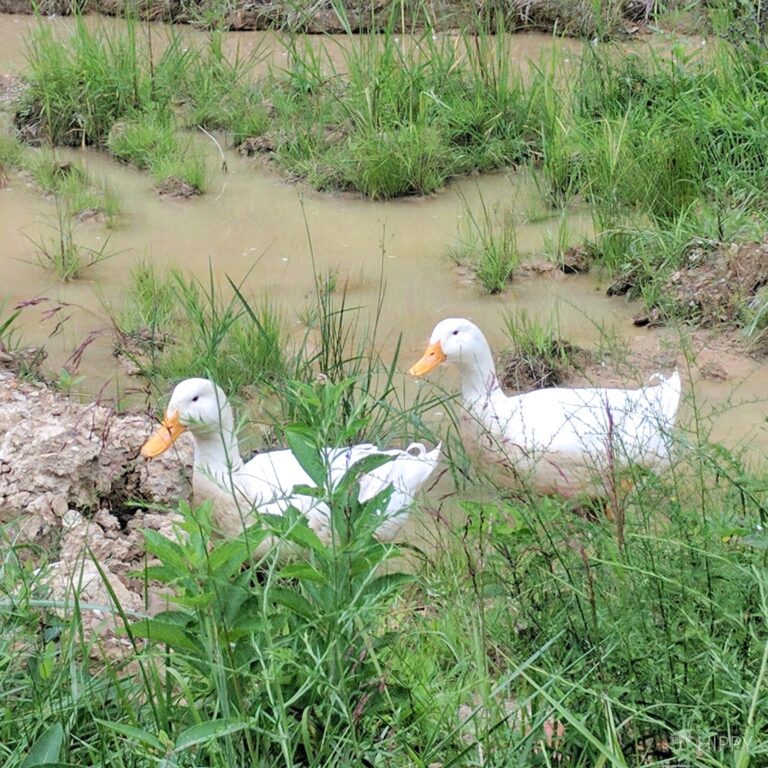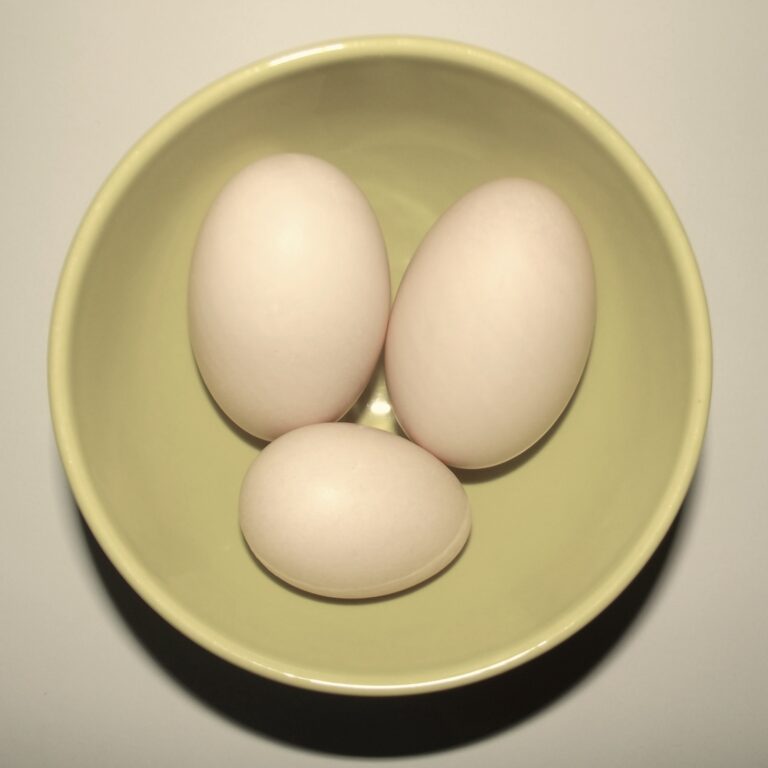Ducks are one of the most common birds in the world, and also one of the most common species of domesticated poultry. And beyond commercial purposes, many people just enjoy keeping them as pets.

Plus, like all birds, ducks lay eggs to reproduce. This might be your whole reason for keeping them, or it might not, but in any case managing their laying is important. So, how often do ducks lay eggs?
Ducks will generally lay between 2 and 5 eggs per week. This is dependent on factors such as breed, age, health and environmental influences. Some ducks lay year round while others are seasonal layers.
Ducks are rarely as prolific layers as chickens, but they can still crank out the eggs under the right circumstances.
And also like chickens, ducks will lay more or less eggs depending on a whole host of factors and conditions.
Understanding these variables is essential if you want to maximize or just manage your flock’s production. Keep reading and I will tell you all about it…
How Many Times Do Ducks Lay Eggs Per Year?
The number of times ducks lay eggs per year can vary greatly depending on the breed, whether they are wild or domestic, and seasonal factors.
Some domestic duck breeds, like the Khaki Campbell and Pekin, are prolific layers and can produce over 200 eggs per year. Wild ducks, on the other hand, may only lay eggs during specific seasons and only enough to make a good sized clutch.
This might mean only 12- or 20-something eggs per year! Seasonal laying habits also affect egg production, with some ducks producing fewer eggs during colder months or when daylight hours are reduced.
Do Seasonal Changes Affect Laying?
Yes. Seasonal changes indeed influence the egg-laying habits of laying hens. As daylight hours decrease and temperatures drop, egg production may decline depending on the breed.
This is because the birds’ bodies respond to environmental cues that signal it might not be an ideal time for raising chicks.
Additionally, some breeds and species, wild and domestic alike, do not lay eggs year-round regardless of seasonal changes.
Understanding the specific egg-laying patterns of a chosen breed or species is crucial for predicting when to expect eggs from ducks.
Do Ducks Lay Multiple Eggs Per Day?
Possible, but highly unlikely. While it is possible for ducks to lay multiple eggs in a single day, this occurrence is rare.
Ducks lay no more than one egg per day. However, there may be instances where a duck lays two eggs within a 24-hour period. Factors that may contribute to a duck laying multiple eggs in a day include the bird’s age, breed, and overall health.
What Time of the Day Do Ducks Usually Lay Their Eggs?
As a rule of thumb, early in the morning. Ducks generally lay their eggs in the AM, usually before or just after sunrise.
This timing is instinctive, allowing them to take advantage of the cooler temperatures and reduced predator activity during this time of day.
It’s rarer for ducks to lay eggs later in the day, but it does happen. Knowing this, you’ll need to routinely check nesting areas early in the morning to ensure that any freshly-laid eggs are collected promptly.
This helps to keep them clean and reduce the chances of incidental damage or predation.
When Do Ducks Usually Stop Laying Eggs?
It depends on the duck. Wild ducks typically stop laying eggs at the end of the mating season or after they have laid enough eggs for a full clutch.
Domestic ducks, on the other hand, may stop laying eggs seasonally, depending on breed, or when they reach an older age and their laying naturally declines, then halts.
The cessation of egg-laying in domestic ducks is further influenced by factors such as nutrition and overall health.
Usually a domestic duck will be pretty old when she decides to quit laying, at least compared to a chicken, at around 7 to 9 years of age.

Can Duck Hens Lay Eggs Without a Male?
Yes. Just like chickens, duck hens can lay eggs even if they haven’t been fertilized or mated by a male, also known as a drake.
These unfertilized eggs will not develop into ducklings, but they are still safe and suitable for consumption.
It’s important to note that the presence of a drake is only necessary for producing fertilized eggs that can hatch into ducklings, not for egg-laying itself to occur.
Keep in mind this means you must provide a suitable environment and proper nutrition for your duck hens to ensure they continue to lay eggs regularly and safely, regardless of whether a drake is present or not!
Do Some Duck Breeds Lay More or Fewer Eggs?
Yes. There’s a significant variation in egg-laying capabilities among duck breeds. Some breeds are known for their truly prolific egg production, laying a large number of eggs year-round.
The aforementioned Pekin is famous for regular, high-volume egg laying. In contrast, other breeds like Muscovy ducks or some ornamental breeds may be more conservative layers, producing fewer eggs annually.
When choosing a duck breed for egg production, make sure to research and select a breed with the desired egg-laying capacity.
Something else to know is that exceptional individual ducks always exist in any breed, both good and bad!
You might wind up with a duck from a breed known for laying few eggs only to find out you have a super high-producing layer in your flock!
It’s always a pleasant surprise when this happens, but it’s important to know the average egg production of any breed before deciding which duck is best for you.
What Other Factors Affect When Ducks Lay, and How Many Eggs?
Several factors can influence when ducks lay eggs and the number of eggs they produce. Health is a big one. A healthy duck is more likely to lay consistently and produce a higher number of eggs.
Regular health checks and proper care are essential for maintaining good egg production under all conditions.
Weather is another biggie. Extreme weather conditions, such as very hot or cold temperatures, will change egg-laying patterns and reduce the number of eggs produced.
Also a well-balanced diet is crucial for supporting consistent egg production. Ducks require specific nutrients to produce eggs, and a lack of any of these nutrients can affect egg production.
Finally, disturbance or stress is a major factor. Ducks don’t like being disturbed, and may stop laying eggs when they feel uncomfortable or scared.
That means it’s important to minimize the amount of activity and noise around their nesting areas, particularly during the hours before sunrise when ducks are most likely to lay.
Will Ducks Lay Eggs in Any Environment?
Generally yes. Ducks can lay eggs in most environments, but severe conditions may impede or slow down egg production.
Extremely hot or cold temperatures, inadequate shelter, or dangerous weather can negatively impact a duck’s ability to lay eggs consistently.
You must provide your ducks with a suitable environment that meets their basic needs, including appropriate shelter.
What are the Ideal Nesting Conditions for Laying?
Ducks, like all birds, greatly prefer to nest in a particular kind of nest made with particular materials.
Though these instincts are somewhat dampened in most domestic breeds, and indeed they are infamous for nesting anywhere besides their nest boxes, it’s still important to consider.
The following factors contribute to creating the perfect nesting space for your ducks:
Seclusion: Ducks prefer a secluded and quiet spot to lay their eggs. Providing a private nesting area away from high-traffic areas and human or animal presence helps reduce stress and allows ducks to feel secure while laying.
Shelter: A well-protected nesting area is essential to keep ducks safe from predators and also from harsh weather conditions. Adequate shelter also helps regulate temperature and humidity, ensuring a viable environment for laying.
Nest Material: Soft, clean, and absorbent bedding materials like straw or wood shavings should be used in the nesting area. This provides cushioning and insulation for the eggs and ensures a clean environment.
Space: Each duck should have enough space to comfortably enter, turn around, and exit the nest. Providing ample space helps prevent overcrowding and stress. Provide these things and your ducks will lay regularly.
What Nutritional Elements Do Laying Duck Hens Need in their Diet?
One of the most important factors for laying hens, a balanced and nutritious diet is crucial so ducks can maintain their health and produce healthy, viable eggs.
Key nutritional elements for laying ducks include calcium which is essential for strong eggshells and bone health. Providing a diet rich in calcium, such as through layer pellets or crushed oyster shells, ensures proper calcium intake.
A high-quality protein source is also, as always, necessary for overall health and egg production. A diet containing at least 16% protein is recommended for laying ducks.
Ducks also require lots of essential vitamins and minerals for optimal health. They also need constant access to clean, fresh water for drinking and bathing. Adequate hydration is vital of the eggs themselves and for mom.
Keep in mind that hens rarely eat while brooding, so ongoing nutrition well prior to the start of laying is crucial to ensure they have the necessary energy reserves to lay and care for their eggs if they do go broody.
Tom has built and remodeled homes, generated his own electricity, grown his own food and more, all in quest of remaining as independent of society as possible. Now he shares his experiences and hard-earned lessons with readers around the country.
Find out more about the team here.
